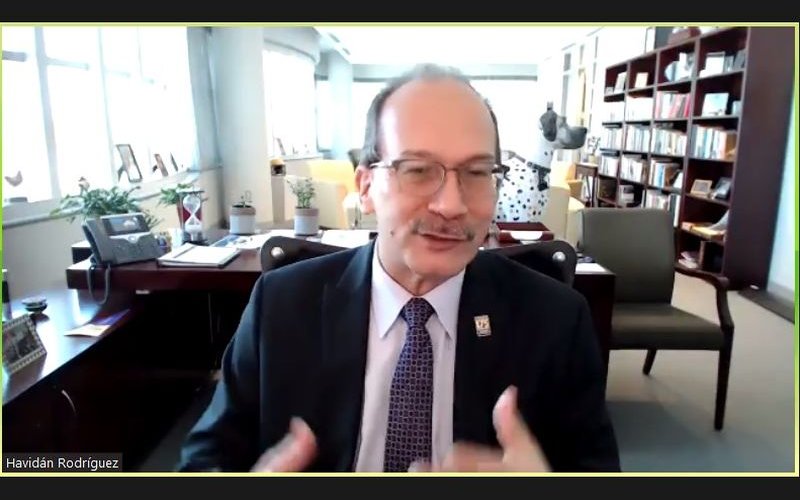Learning by listening: President continues tours of schools and colleges

ALBANY, N.Y. (Feb. 16, 2021) — Providing first-hand updates on COVID-19 and budgetary challenges, hearing about concerns, learning of the achievements of the University’s schools, colleges and administrative divisions — these are some of the topics of conversation at the ongoing Listening and Learning Tours President Rodríguez has been conducting since he arrived at UAlbany in September 2017.
While the pandemic moved these formerly in-person visits to a virtual platform, the format is the same: remarks from the president and division leader, whether dean or vice president, followed by an open question and answer period. And as with the Extended President’s Council meetings, one unanticipated outcome of these COVID-related times, is that the Zoom meetings have afforded more the opportunity to attend than did the in-person meetings with the president and his Executive Council.
Late last month, Vice President for Student Affairs Michael Christakis hosted Rodríguez for an in-depth discussion with division staff. The conversation ranged from budgetary issues to the logistics of student life in the age of COVID-19, to possible ways to reduce the burden on staff that comes from operating during a pandemic.
Last week the president met with the University Libraries, and future sessions are planned for the spring with Finance and Administration, Research, Academic Affairs and Advancement. Last semester the president and the Executive Council met with the faculty and staff of each of the University’s schools and colleges over the course of the fall semester.
College of Arts and Sciences Dean Jeanette Altarriba said it’s important to have these focused conversations with University leadership. “We value the opportunity to share our strengths and achievements and to engage in thoughtful dialogue on UAlbany’s strategic priorities and the ways in which the College of Arts and Sciences can further support and expand upon those priorities,” she said. “Our voices are heard, and we are grateful for the opportunity to directly engage with the president.”
While much of the focus of these meetings is narrowly targeted to the individual divisions, overriding issues about the financial challenges brought on by the pandemic seem to come up at every session.
“We are clearly confronting some very difficult budgetary decisions, but if we take a collaborative approach to designing our future, firmly grounded in our core strategic priorities, I believe we will be able to emerge as a stronger and more resilient institution,” Rodríguez said. “As we continue to navigate the many challenges and opportunities before us, I look forward to future discussions about how to drive our collective success forward for the betterment of our students, our University and our communities.”
At times, issues brought up during these Listening and Learning sessions have brought direct change. For instance, during a session with the School of Public Health in October, concerns were raised about how canceling spring break might impact an already stressed student body. As a result of the discussion, President Rodríguez asked Provost Kim to revisit the issue, which coincided with concerns that students and faculty were also voicing. The spring semester calendar was ultimately changed to suspend classes for two days, as a sort of mental health break for students.
This spring’s LLT sessions seem to be even more focused on the University’s budgetary challenges and optimism for next steps in a post-COVID world. Asked if he envisions more LLTs next year, Rodríguez said “I don’t see why not. I personally have found the LLT sessions to be invaluable for both myself and my executive team to learn first-hand what is on the minds of our faculty and staff, and for them to learn what we are doing about issues that matter to them.”




